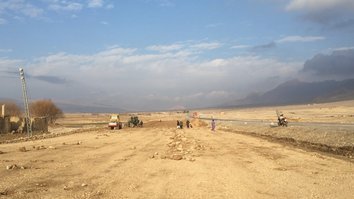QUETTA -- Pakistani forces are attempting to stem a growing wave of militant activity in Balochistan that is tied to ongoing projects linked to China's Belt and Road Initiative, also known as One Belt, One Road (BRI or OBOR).
Four policemen were killed on April 11 in a gun battle with militants in Balochistan province, police said, hours after four people died in a bomb blast in Quetta, the provincial capital, according to AFP.
Militants identified by police as being from the Tehreek-e-Taliban Pakistan (TTP) opened fire on a pre-dawn patrol in Kuchlak, officials said.
A day earlier, four people were killed -- two police and two civilians -- by a motorcycle bomb in a busy market of Balochistan's capital, Quetta.
That attack was claimed by Baloch militants. The Balochistan Liberation Army (BLA) has been active in the province.
Chinese interests have long been the target of both Baloch militants and terrorist groups such as the TTP.
Ethnic Baloch militants have especially tapped into sentiment that Chinese investment under the BRI has not benefited locals.
Demonstrators in Gwadar have held several demonstrations seeking an end to illegal deep-sea fishing by local and Chinese trawlers and to the harassment of locals at security checkpoints leading to Gwadar port, where construction is under way to benefit Chinese interests.
The recent re-approval of a Chinese 300-megawatt power project based on imported coal in Gwadar has also raised both economic and environmental questions.
Chinese-built coal-fired power plants in Pakistan rely on fuel that is becoming more expensive because of unrest in South Africa and Russia's invasion of Ukraine. They also pollute the air that Pakistanis have to breathe.
Such controversial and painful efforts to upgrade infrastructure, power and transport links between the Xinjiang region of China and Gwadar port -- with little regard for residents of Balochistan -- are part of a $54 billion project known as the China-Pakistan Economic Corridor (CPEC).
Terrorism the result
"It can be said with certainty that the major reason for the acceleration in attacks by Baloch militants is to foil the ongoing foreign investment, which continues to thrive," Muhammad Javed, a Quetta-based senior security official, told Pakistan Forward.
To deal with the recent wave of terrorism in Balochistan, intelligence-based operations are taking place in all the troubled areas of the province, according to provincial home and tribal affairs minister Ziaullah Langove.
Many key leaders of militant groups involved in terrorism have been killed and arrested in the ongoing operations, he told Pakistan Forward.
"At the provincial level, a high-level investigation team has been formed in Balochistan, which includes officers from all relevant law enforcement agencies," he said.
"The joint team will complete the investigation of the recent incidents of terrorism and submit its report to the government in two weeks, after which further action will be taken," he added.
The current situation in Balochistan "cannot end" unless real discussion occurs in regards to CPEC, security affairs analyst Nadeem Khan told Pakistan Forward.
"If steps were taken keeping in mind the ground realities regarding the CPEC project, the situation would not have been so dire," National Party chief and former chief minister of Balochistan Abdul Malik Baloch told Pakistan Forward.
"Gwadar is the aorta of Balochistan. When the local population will not benefit from this most important strategic asset, how can you possibly improve the situation and end the resistance?" he asked.

![The Pakistani and Chinese flags fly over an event at Gwadar port in this undated photo. [Gwadar Port Authority]](/cnmi_pf/images/2023/05/01/41742-gwadar-585_329.jpg)






